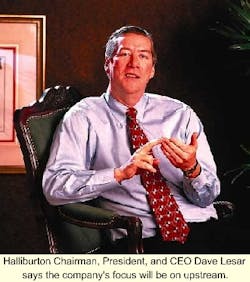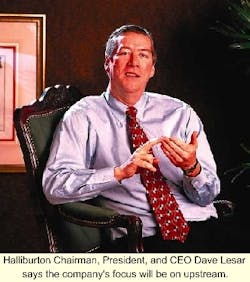Services giant to focus on upstream, subsea, deepwater with new leader
Halliburton Chairman and CEO Dick Cheney accepted an invitation to be George W. Bush's vice presidential running mate for the Republican Party in the upcoming US presidential elections. David J. Lesar was named as the company's new Chairman, President, and CEO. He was prev-iously President and COO of Halliburton and joined the company in 1993 as Executive Vice President CFO of the Halliburton Energy Services business unit. He served the company in a variety of senior management positions, including Executive Vice President and CFO of Halliburton and President and CEO of Brown & Root. He discussed what this change in leadership means for the world's largest oil field service company.
Offshore: Dick Cheney's departure happened rather quickly; were you surprised by your promotion to CEO of Halliburton?
Lesar: Clearly, the succession plan Dick had shared with the board over the last couple of years named me as the person who would step up if he left. Therefore, it was not a surprise to me. I believe the board had a discussion with him last December when they held their annual succession-planning meeting.
Offshore: Did you anticipate Cheney would be tapped as Bush's running mate?
Lesar: Based on the discussions I had with Dick all along, I think he had every intention of finding a candidate for the Governor and had no intention of taking on that role himself. It really wasn't until mid-July that Dick and I discussed the possibility he would be leaving.
Offshore: Cheney's background is political, while you come from a financial background. How will this difference be reflected in the direction you take Halliburton?
Lesar: While my background is financial, I've been involved in operations at Brown & Root or Halliburton for the last five years. Dick and I worked closely together in developing the current strategy for Halliburton. We are focusing on better technology and cheaper solutions for producers as they move into deeper water. The name of the game is reducing finding and development costs. We have put together an organization with capabilities all across the downhole and surface area. I don't think there will be any major shift in direction; although, I will focus on one or two areas Dick might not have.
Offshore: What areas in particular are you planning to emphasize?
Lesar: We will make sure our business is more focused on the upstream marketplace. Right now we are balanced between upstream and downstream, but our shareholders are interested in a focus on the energy sector and an emphasis in upstream. As we look for new technologies and potential acquisitions, that is where the focus will be.
Offshore: Any area of the upstream sector you are looking to fill out through an acquisition?
Lesar: In the past, we have purposely avoided aligning with any specific technology in the subsea area. We wanted to be the engineering and construction firm of choice without regard to the client's specific technology or solution. That's an area we're taking a look at. It is at the top of my priority list.
Offshore: There are some big players in subsea. Would you be looking at partnering with one of these companies, or acquiring a smaller niche player?
Lesar: I don't think we're looking at making any big acquisitions at this time. We're really looking for opportunities to combine our capabilities and skill base with a company whose expertise complements these skills. This could take the form of an alliance, joint venture, or possible acquisition of a smaller bit player with niche technology.
Offshore: How soon will we see Halliburton move on this priority?
Lesar: We are very conservatively capitalized, as conservative as any of the major service companies. However, we will have a large amount of money coming in toward the end of the year from the sale of the Dresser equipment group. Without setting any self-imposed deadline, we are going to have to look at ways to re-deploy that capital.
Offshore: What recent project would you say best defines the Halliburton of the future?
Lesar: I think the Barracuda Caratinga project (Campos Basin off Brazil) is a potential model demonstrating the capabilities of the entire Halliburton Group. In this case, Petrobras, who owns the reservoir and production, turned to one contractor to drill and complete the wells, do the subsea work, tie-ins, and floating production equipment. Halliburton offered the best price and shortest time to first oil. More customers around the world are looking for this type of turnkey solution, and Halliburton is positioned to provide these services. That doesn't mean we will de-emphasize our core areas of expertise. It is these key areas that allow us to be so competitive worldwide.
Offshore: What is something we won't see Halliburton doing in the future?
Lesar: There is a distinct line in terms of what the integrated oil companies consider their core capabilities and where they need to interface with the service companies. There are projects where the service companies will be asked to share the risk in order to participate in the reward. The direction now seems to be toward a fixed price for projects more than a partnership arrangement. Halliburton has the advantage here, where the real efficiencies come from linking the reservoir and facilities. By designing and planning the wells and the facilities, you avoid the potential for disconnects that can occur when the components do not match or the facilities are not optimized for the reservoir.
Offshore: Could Halliburton be the oil company of the future?
Lesar: The integrated oil companies want to be known for two things: the development of resources and retailing of energy products - oil, gas, power. They are interested in exploration, development, and retailing. In pursuit of this, they de-emphasize the production side of the equation. It is here that the service companies can step in to maximize the value of the reservoir through well planning, workover optimization, and efficient running of facilities. The service companies, such as Halliburton, are just responding to the changes of our customers. But we are not an oil company. We do not have an interest in holding reserves or equity. Investors put their money in Halliburton because of the margins we make off of service work. We would be doing our shareholders a disservice if we started down the path of doing what an oil company has traditionally done.
Offshore: You mention shareholders. How do the movements on Wall Street, particularly the commodities market, affect your business?
Lesar: Our stock price, and the stock prices of the service companies, reacts to the underlying commodity prices of oil and gas. Our actual business is more closely related to the capital and operating expenditure patterns of our customers. Clearly, over time, the two are related, but in the current market our customers are still looking at a price in the $14-17/bbl price range when approving projects. For major deepwater projects, the test is more like $9/bbl. Because these projects are tested at such low prices, we are confident that our customers' spending plans will not vary with marginal shifts in the price of oil.
Offshore: How important is the stock price to your business plan?
Lesar: You have to please the analysts and shareholders on a quarterly basis, but the majority of people investing in this industry are very knowledgeable about the trends and cycles that drive service companies. However, the energy sector is viewed as a conservative place to invest. When another sector, such as high tech, drops in value, there is often a surge in oil service stock prices as much of this money moves into the energy sector. Ultimately, these day-to-day fluctuations are less important than the fundamentals of capital spending, long-term energy price prediction, supply and demand, depletion, and available reserves.
Offshore: How will Halliburton address the ongoing shortage of qualified personnel in this industry?
Lesar: We currently have hundreds of job openings which we will eventually fill, but it's a constant struggle. Our strategy is to ramp up our recruiting efforts at schools overseas. With 70% of our work being performed outside the US, we have contacts, infrastructure, and opportunities in almost every country in the world.

